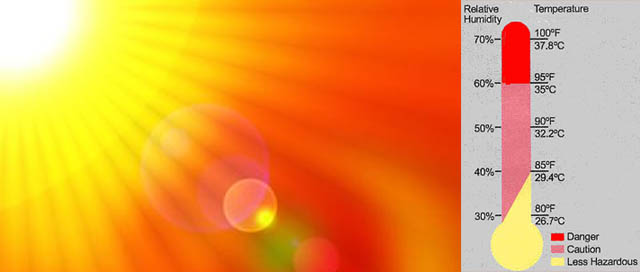Heat stress is the buildup in the body of heat generated by the muscles during work and of heat coming from a hot environment. Heat exhaustion and heat stroke result when the body is subjected to more heat than it can cope with.
When the body becomes overheated, less blood goes to the muscles, brain, and other internal organs. You get weaker, become tired sooner, and less alert, and less able to use good judgment. Symptoms of heat exhaustion include profuse sweating, weakness, nausea, vomiting, headache, lightheadedness, and muscle cramps.
As the condition becomes more severe, there can be a rapid rise in body temperature and heart rate. You may not realize that this is happening because there is no pain. Mental performance can be affected with an increase in body temperature of just 2 degrees F above normal. An increase of 5 degrees F can result in serious illness or death.
Heat exhaustion can progress to heat stroke when the body’s temperature regulation fails and spirals out of control. The individual becomes confused, lethargic and may have a seizure, the skin stops sweating and the body temperature may exceed 106 F (41 C ). Its effects can include confusion, irrational behavior, convulsions, coma, and even death. Heat stroke can cause varying degrees of brain and kidney damage. More than 20 percent of people that get heat stroke die, even young and healthy adults.
The body normally generates heat as a result of metabolism, and the body is usually able to dissipate the heat by either radiation of heat through the skin or by evaporation of sweat. However, in extreme heat, high humidity, or vigorous exertion under the sun, the body may not be able to dissipate the heat and the body temperature rises
Those most susceptible to heat strokes are infants, the elderly, athletes, or any outdoor worker physically exerting themselves under the sun.
Prevent heat stroke.
Most importantly, avoid becoming dehydrated. A dehydrated person may not realize that they are dehydrated, and will not be able to sweat fast enough to dissipate heat, which causes the body temperature to rise. Drink plenty of fluids (such as water and Gatorade).
Avoid vigorous physical activities in hot and humid weather (common sense). If you have to perform physical activities in hot weather, take frequent breaks to hydrate yourself. Wear hats, and light colored, loose clothes.
Avoid alcohol, coffee, and tea which may lead to dehydration.
If you enjoyed this, or topics of survival preparedness or current events risk awareness,
check out our current homepage articles…
http://feedproxy.google.com/~r/ModernSurvivalBlog/~3/wEx5poX79_U/

No comments:
Post a Comment
Note: only a member of this blog may post a comment.